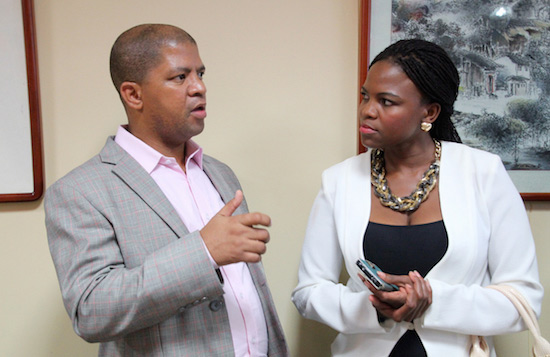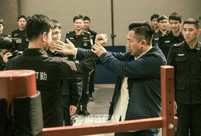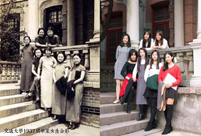


Mario Williams (left) talks with his colleague at the reception for the Cooperation of Human Resource Development between China and SA on March 9 in Pretoria. Picture: PEOPLE’S DAILY ONLINE/SISSY CHEUNG
Tailor-made training programmes are provided to selected South African government officials and technicians by the Chinese government, looking at SA’s requirements, especially training programmes focused on re-industrialisation, ocean economy, civilian nuclear power and special economic zones (SEZ).
As the first beneficiaries of the Cooperation Programme in Human Resource Development between the two nations, 470 South Africans have attended five bilateral training programmes and more than 100 multilateral training programmes in China, which saw a record high over the years.
Up to the end of 2015, the Chinese government had provided training for more than 2,000 South African officials and technicians.
Based on the bilateral strategic agreement on human resource development reached in 2014, China is to gradually increase the training opportunities for South Africans and will provide training for another 2,000 over the next five years.
In order to meet this target, it was agreed that each year 400 people would be trained. The next intake will be in April when about 400 participants will again travel to China.
GhaleebJeppie, chief director for international relations in the Department of Higher Education and Training, emphasised the significance of international exposure to compete effectively in a globalised economy. “South Africans need to be exposed to international practices, cultures and experiences. International exposure builds skills that are transferrable to both our person- al and professional lives.”
According to Jeppie, the Chinese government has since 2003 provided SA with hundreds of scholarships. Half of these students have completed their undergraduate or postgraduate degrees, and have returned home and are now contributing to SA’s economy. “This recent addition of 2,000 training places will con- tribute substantially to plugging the skills gap we have,” he says.
SA is in the process of re- industrialisation whereby large numbers of talent in both social and economic management and industrial practices are required. Mario Williams, Deputy-Director: Economic/Commercial Diplomacy at the Department of Trade and Industry, is one of the 30 officials who attended the seminar on the construction and management of the development area for SA, also known as the programme specialised in SEZs.
Williams said that the training was instrumental in shaping the planning and management of SA’s SEZ programme.
Thirty officials from the South African government and pro- posed SEZ areas participated in the programme, with the aim of developing requisite capacity and skills for the planning and management of the SEZs as key contributors to economic development and growth engines for industrialisation, regional development as well as employment creation.
The training consisted of lectures and interactions with policy makers of the Chinese government, academia, SEZ operators and consultants involved in the field of SEZs. Other components of the programme included study tours to numerous development zones and factories in China’s Tianjin, Beijing and Shanghai.
“This provided us with practical exposure of fully functioning zones and operations at selected companies,” Williams said.
He also highlighted the key benefits from the programme as clear policy direction, dynamic government response and integrated approach to investment promotion.
Williams shared another direct experience: “When one has personally experienced a country or a city, it creates an eternal connection.”
He speaks of the concern from the group for Tianjin as the host city of their stay, his suit bought from the famous Silk Street in Beijing, and how he learnt to bargain when they went shopping in China.
RongYansong, Chinese Economic and Commercial Counsellor in SA said: “These training programmes expanded the civil exchange between our two countries and provided chances for the peoples of our two countries to further understand each other’s history, culture and ways of thinking.”
He added that the cooperation on human resource development serves not only as a bridge of cultural understanding, but also a boost to SA’s social and economic development.
“China sincerely wishes to share its experiences in development, advanced and applicable technologies with global developing countries.”
According to Rong, many trainees resume their work and deliver better services with the idea, knowledge, skill or expertise gained during the programmes they attended.
Some of them even found new opportunities in trade or investment that are directly or indirectly related to the Sino-SA economic cooperation.
(The story was originally published on Business Day on March 31st, 2016.)
 Train rides through blossoms
Train rides through blossoms HD pictures of battleships of PLA Navy
HD pictures of battleships of PLA Navy East Sea Fleet conducts combat drills
East Sea Fleet conducts combat drills Sophie Marceau goes square dancing in Guangzhou
Sophie Marceau goes square dancing in Guangzhou Police officers learn Wing Chun in E. China
Police officers learn Wing Chun in E. China Charming models compete in super model contest in Beijing
Charming models compete in super model contest in Beijing Thai most beautiful transgender Nong Poy release new photos
Thai most beautiful transgender Nong Poy release new photos Now and then photos of Shanghai Jiaotong University
Now and then photos of Shanghai Jiaotong University Is this what air travel will look like in 2050?
Is this what air travel will look like in 2050? Top 20 hottest women in the world in 2014
Top 20 hottest women in the world in 2014 Top 10 hardest languages to learn
Top 10 hardest languages to learn 10 Chinese female stars with most beautiful faces
10 Chinese female stars with most beautiful faces China’s Top 10 Unique Bridges, Highways and Roads
China’s Top 10 Unique Bridges, Highways and Roads Vaccine scandal injects worry, anger
Vaccine scandal injects worry, anger  Zhiqingband together to care for each other
Zhiqingband together to care for each other China’s live broadcasting gravy train
China’s live broadcasting gravy train Steady diplomacy expected from Myanmar's new government
Steady diplomacy expected from Myanmar's new government Day|Week